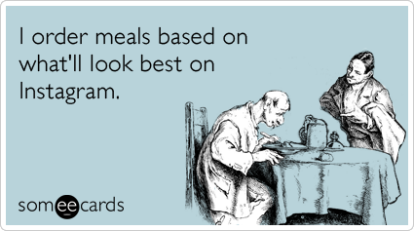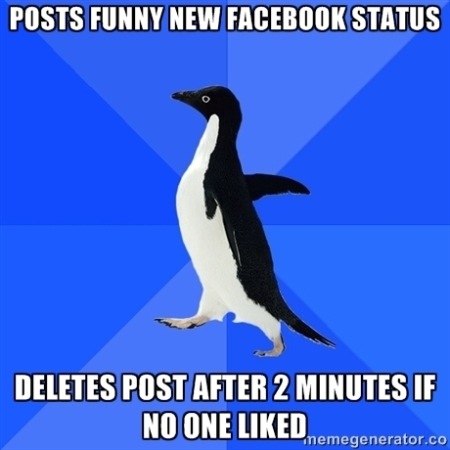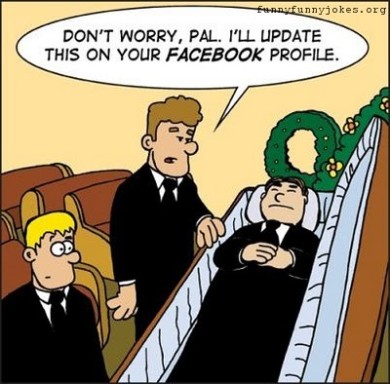A couple of months ago, I stumbled upon a parody video called “Look at this Instagram”, which uses Nickelback’s song “Photograph” with adapted lyrics to make fun of the average “igaddict”, or, translated into a language we can all understand, the Instagram addict.
The lyrics make fun of the things people post on Instagram, and include lines such as, “Fireworks in the sky, a super close-up of my eye, now a selfie lookin’ cute, in the same room where I poop”. I love the self-reflexivity and humour of the video, but at the same time, it makes me wonder if we are missing out on important moments because we are too busy uploading things onto Facebook or Instagram.
As an Asian, I think it is acceptable for me to say this about my own race; it doesn’t happen to all people I’m sure, but it just seems to be more prevalent among Asians. It is the weirdest phenomenon, (and I’m guilty of this myself), and that is, whenever we go out for dinner at a nice restaurant and the food comes, the first thing we do is squeal “oh wow, that looks AMAZING”, and then before anyone can even pick up a knife or fork, phones are whipped out, and a dozen photos are taken of the food, from five different angles. The one food photo that makes the cut is then uploaded to Instagram and Facebook, where all 20 people at the table are tagged and a caption like “having the most amazing time, with amazing peeps and amazing food!” And only when everyone has finished doing their own separate uploads, do people actually start on their food, which by now would be semi-cold.
The term “it’s not official until it’s Facebook official” comes to mind. This usually refers to a new couple apparently not being “officially” a couple until they make it public by changing their relationship status on Facebook. Although the phrase is usually applied to relationships, I think it is true for many other aspects of our lives, too. A great night out isn’t “officially” a great night out unless you have photos tagged at the bar looking hot with your 4 best friends. You didn’t “officially” travel to Europe until you have uploaded photos of you having the time of your life. Our lives and our actions are so intertwined with our online profiles that we begin to place our worth according to how many people “like” our statuses, how many “friends” we have, and choosing only the best photos of ourselves to upload onto our profile.
Our online profiles have become our ideal images of ourselves, and we act a certain way in our offline lives in order to sustain that image. In 2004, Facebook began as a college network, for all Harvard students to keep in touch with one another online (Boyd & Ellison 2008:218). It was not released to the public until 2006, and what began as a platform for people to keep in touch with one another, quickly began an online “stage” where people sought to put their best selves forward. Facebook had “applications”, which allowed people to personalize their profiles by displaying their tastes in movies, places they’ve travelled, and their favourite musicians (Boyd & Ellison 2008:218). All of these carefully selected by the owners of the profiles to create an ideal image of themselves that they wished others to see. The number of “friends” a person had also became an indication of popularity, and Boyd & Ellison (2008:219) defines this as “public displays of connection”. The features that were previously intended for keeping in touch with friends, and updating them on one’s life, is now used to display amusing status updates, photos of one’s “crazy”, “awesome”, “fun” life, in order to garner “likes” and envious comments like “oh wow that looks amazing! I wish I was there!”
Our “online life” is taking over our offline life, and we do things solely to make this online image of us look more attractive and desirable. We often say things like “oh that’s definitely profile pic material”, or “that would make a great Facebook status update”, and it seems our online identity greatly influences our offline identity. I wonder how different our lives would be if Facebook and other social network sites were never invented? Would we actually do things for the sake of doing things we enjoy, and not worry about what other people would think of it? I know I would probably enjoy beautiful scenery a lot more if I wasn’t too busy viewing it through the lens of my iPhone trying to get the perfect “instagrammable” shot.
Reference:
boyd, d. & Ellison, N. (2007). Social network sites: Definition, history, and scholarship. Journal of Computer-Mediated Communication13, 210-230.



